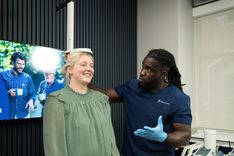
What is the Follicle Stimulating Hormone?
Follicle stimulating hormone (FSH) plays an important role in the normal function of both male and female reproductive systems. In females, it stimulates the growth of eggs during the menstrual cycle, while in males, it is important for healthy sperm production.
Abnormal FSH hormone levels can cause infertility, so an FSH blood test is often used in people who may be experiencing problems getting pregnant. However, there are many other reasons you may want to invest in a private FSH hormone test and learn more about your hormonal health.
Explore in more detail what the follicle-stimulating hormone is, how its role is important for reproductive health, and when to consider getting your levels tested.
What is follicle stimulating hormone?
Follicle stimulating hormone (FSH) is a hormone made in the pituitary gland. It plays an important role in both male and female sexual development and reproductive health.
In adult females, abnormal FSH levels are often associated with problems getting pregnant, irregular or even absent periods, or the start of menopause.
In adult males, abnormal FSH levels are often linked with difficulty getting their partner pregnant, a low sperm count, low muscle mass, or decreased sex drive.
What does FSH do?
The function of the FSH hormone depends on the type of sexual organs you have and your age:
FSH during puberty
FSH levels are usually low in children, but as puberty approaches, the hypothalamus produces gonadotropin-releasing hormone. This triggers FSH and luteinising hormone (LH), which begins the change toward sexual maturity and development.
In boys, FSH and LH work together to trigger the testes to start producing testosterone, which is responsible for the physical changes of puberty, such as body hair growth and voice deepening, as well as the production of sperm.
In girls, FSH and LH trigger the ovaries to start producing oestrogen, the hormone responsible for breast development and menstruation in females.
FSH in menstruating females
In menstruating females, FSH regulates the menstrual cycle by stimulating follicles and helping to prepare eggs for ovulation. As a result, it is normal for FSH levels to fluctuate throughout a woman’s menstrual cycle:
-
Between days six and 14 of the menstrual cycle, the release of FSH causes follicles in one of the ovaries to mature.
-
Around day 14, a surge in LH causes one fully mature egg to rupture and release an egg, known as ovulation.
-
After ovulation, the ruptured follicle forms a corpus luteum. This produces high levels of progesterone, which blocks the release of FSH and helps prepare the uterine lining for pregnancy. FSH levels are naturally lower during this period.
-
The egg then travels through the fallopian tube to the uterus. If sperm successfully fertilises the egg, it results in pregnancy. If no fertilisation occurs, the corpus luteum breaks down, progesterone production decreases, a woman gets her period and FSH levels start to rise again.
FSH in males
In males, FSH stimulates sperm production in the testes. It also works with testosterone inside the testes, which is triggered by LH, to sustain sperm production.
How can I test for follicle stimulating hormone?
It is possible to test FSH hormone function as part of a female or male hormone test using a simple blood sample. A trained health assessment specialist will collect a small blood sample from a vein in your arm. This sample is then sent to a laboratory for analysis. The laboratory will analyse your blood sample to provide insights into your FSH levels.
In females, a hormone function test can help in:
- Investigating the potential cause of irregular periods
- Alongside a clinical history, predicting when or if they have entered menopause
At Bluecrest Wellness, we offer private FSH blood tests as part of a hormone package for complete peace of mind. We use the latest technology for all of our tests to ensure the most accurate results and all of our tests can be booked at a time and location that’s convenient for you.



































































































